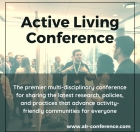7:15 a.m. - 3:00 p.m. Conference Registration
7:00 a.m. - 8:30 a.m. Breakfast
8:30 a.m. - 10:00 a.m. Concurrent Presentations
SESSION 7: Bicycling Relationships: It's Complicated
a) Drivers' attitudes and behaviors toward bicyclists: Stereotypes, normative beliefs, and the role of personal experience, T.B. Goddard, Texas A&M University, USA
b) Better bicycle infrastructure for equitable cities, T. Schwarz, Kent State University, USA
c) Cyclist safety and pollution exposure: Examining the “double burden” of bicycling in socially-disadvantaged communities, D. Piatkowski, University of Nebraska Lincoln, USA
d) Incorporating level of traffic stress into bike planning for schools: Lessons learned, K.M. Ralph, Rutgers, USA
SESSION 8: Go Outside and Play! Kids' and Teens' Physical Activity
a) Meeting new Canadian 24-Hour Movement Guidelines for the early years and associations with adiposity among toddlers living in Edmonton, Canada, E.Y. Lee, University of Alberta, Canada
b) Prevalence and correlates of meeting active play standards of practice in family childcare centres for the early years (3-5) in British Columbia, K.A. Weatherson, University of British Columbia, Canada
c) Let them play: Physical activity of children attending Play Streets in four diverse rural communities, M.R. Umstattd Meyer, Baylor University, USA
d) Physical activity participation among Canadian adolescents with Autism Spectrum Disorder, P. Jachyra, University of Toronto, Canada
SESSION 9: Insights into Institutions: How to Get Things Implemented
a) Active living collaboration in local government, J.A. Dunnington, University of Central Oklahoma, USA
b) 2016 national profile of local health departments: Preventing chronic diseases and promoting active living at the local level, B. Kerner, National Association of County and City Health Officials, USA
c) How local parks and recreation agencies can use systems thinking to prioritize and address preventive public health factors, T.L. Penbrooke, GP RED & GreenPlay, USA
d) What stops built environment professionals creating healthier places? R.R. Toms, Design Council, UK
10:30 a.m. - 12:00 p.m. Concurrent Presentations
SESSION 10: Can Walkability Lead to Better Health and Economic Outcomes?
a) A systematized literature review on the associations between neighbourhood built characteristics and walking among Canadian adults, B. Farkas, University of Calgary, Canada
b) Does neighborhood walkability modify the association between ethnicity and prediabetes incidence? G.S. Fazli, University of Toronto, Canada
c) The influence of city size, age and exposure to walkable environments on walking behaviour: A longitudinal analysis in Canada, R. Wasfi, Universite de Montreal, Canada
d) Assessing the economic resilience of transit-oriented and walkable communities on housing values during a housing market downturn, C. Lee, Texas A&M University, USA
SESSION 11: Not Your Old School Gym Class: Improving Physical Activity in Schools
a) Data-sharing with classroom teachers and elementary children’s physical activity at school, K.L. Hodgin, University of Northern Colorado, USA
b) Promoting physical activity in schools: Results of the thriving schools initiative, C. Kelly, Kaiser Permanente Colorado, USA
c) Comprehensive physical activity programs: working with schools to achieve balance in health and educational content in pre-kindergarten through high school, L. Bryant, The University of Texas at Austin, USA
d) Evaluation of physical education quality indicators in public elementary schools in Mexico City, after the implementation of an innovative physical education program promoting active play for all: ‘Jugamos Todos’, D. Salvo, University of Texas School of Public Health, USA
SESSION 12: There Must be a Better Way: Innovative Methods in Active Living
a) Validity of ATS reports vis-à-vis accelerometry: data from the RIGHT TRACKS study, S.G. Ginja, Newcastle University, UK
b) Capturing contextual effects of perceived wellbeing. Does an improved geographical model of activity spaces lead to a better assessment of the factors on wellbeing? K. Hasanzadeh, Aalto University, Finland
c) Quantifying and testing a multicomponent obesogenic built environment measure with childhood obesity, S.M. Hughey, College of Charleston, USA
d) The SMART study: a mobile-health and citizen science methodological platform for active living surveillance, integrated knowledge translation, and policy interventions, T.R. Katapally, University of Regina, Canada
12:00 p.m. - 1:30 p.m. Networking Lunch with Roundtable Discussions
Selected tables will feature a roundtable host who will facilitate a discussion around a chosen topic, giving attendees the opportunity to interact, exchange ideas, and discuss potential synergies. Attendees are not required to pre-register for a topic and are free to choose a table during the event.
1:30 p.m. - 3:00 p.m. Panel Presentation
3:00 p.m. - 4:00 p.m. Town Hall Discussion, Endurance Prizes and Activity Break
The meeting will conclude with an opportunity to reflect on your time at the conference and think about how the experience will impact your efforts to create more activity-friendly communities. Will your work be transformed in some small or large way? What did you learn that you will use? What new collaborations were stimulated? What research needs did you identify? Sharing your story may inspire others.
For detailed information, visit the official ALR2018 conference website: www.alr-conference.com.







